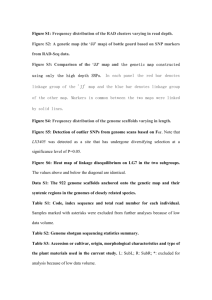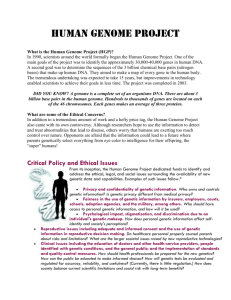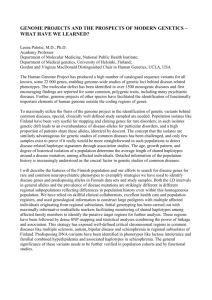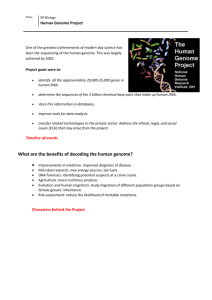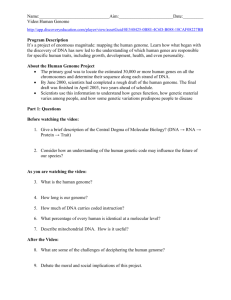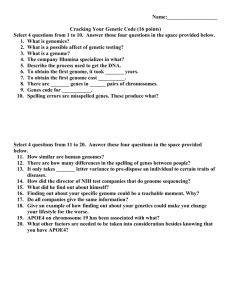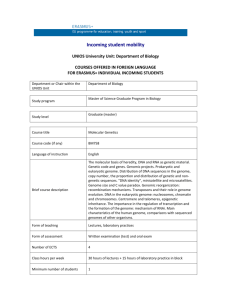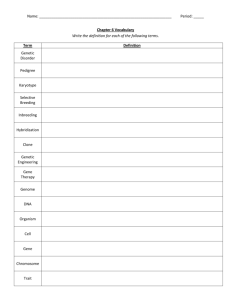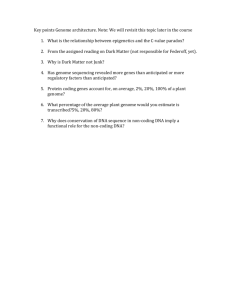1667(2) - Human Genome Project
advertisement
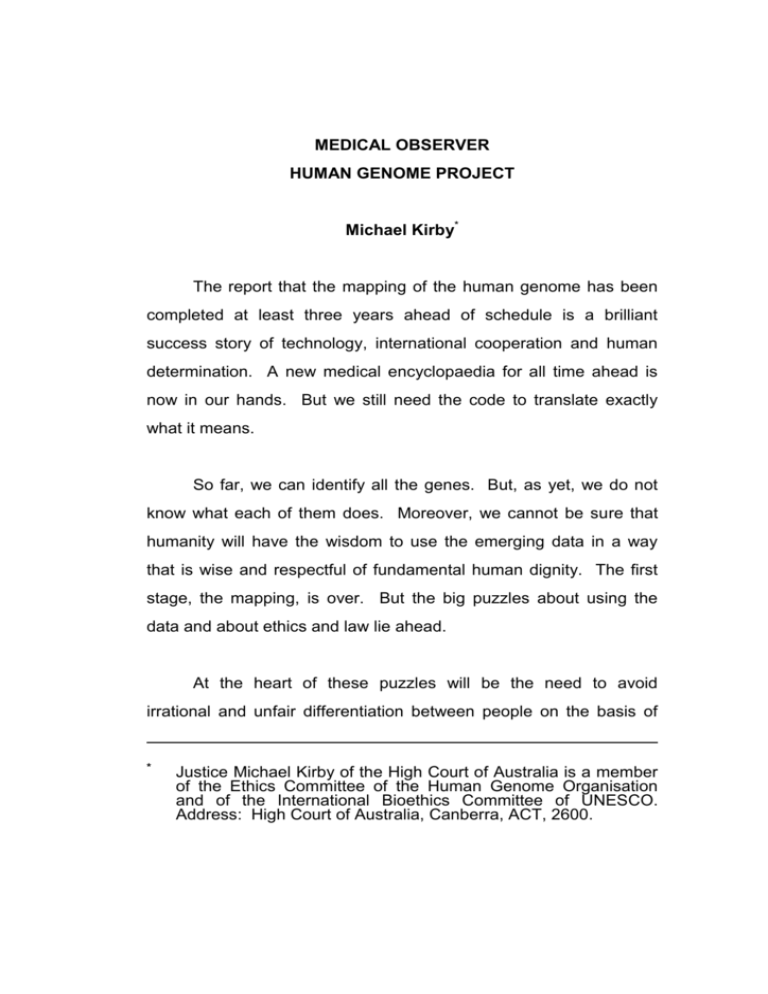
MEDICAL OBSERVER HUMAN GENOME PROJECT Michael Kirby* The report that the mapping of the human genome has been completed at least three years ahead of schedule is a brilliant success story of technology, international cooperation and human determination. A new medical encyclopaedia for all time ahead is now in our hands. But we still need the code to translate exactly what it means. So far, we can identify all the genes. But, as yet, we do not know what each of them does. Moreover, we cannot be sure that humanity will have the wisdom to use the emerging data in a way that is wise and respectful of fundamental human dignity. The first stage, the mapping, is over. But the big puzzles about using the data and about ethics and law lie ahead. At the heart of these puzzles will be the need to avoid irrational and unfair differentiation between people on the basis of * Justice Michael Kirby of the High Court of Australia is a member of the Ethics Committee of the Human Genome Organisation and of the International Bioethics Committee of UNESCO. Address: High Court of Australia, Canberra, ACT, 2600. 2. their genetic profiles. Sometimes making distinctions between individuals can be justified. A person with a highly contagious disease may need to be isolated for the protection of society and the proper treatment of the individual. But the history of the twentieth century has been one of unrelenting irrational and unwarranted discrimination. Such discrimination is still going on. The grounds are frequently based in the genome: the person's race, skin colour, gender, disability and sexual orientation. All of these are wholly or partly genetic in origin. The Universal Declaration of Human Rights in 1948 gave the world a beacon of hope to help steer humanity away from irrational and irrelevant discrimination. Whilst much progress has been made, a lot still remains to be done. The human genome presents new risks of unreasonable differentiation on the basis of genetic testing. We must make sure that, in the new century, the mistakes of the past are avoided. For years it has been possible to identify patients with Tay Sachs disease, sickle cell anaemia and other inherited conditions. The outcome of the Human Genome Project will ultimately ensure that all genetic causes of human differences can be identified. Many genetic triggers for inherited cancers and other serious diseases have already been identified. Amongst those discovered are the genes that mark the presence of late onset disorders such as cystic fibrosis, muscular distrophy, Huntington's disease and, most 3. widespread of all, the two genes apparently related to Alzheimer's disease. The genetic test for Huntington's has a 99% accuracy rate. But there is enormous variation in the ages of onset and the range of symptoms that appear in individuals affected by that disease. In the past, family members would know generally about the inherited conditions of succeeding generations. In the future, they will know exactly. Are the risks of differentiation a real problem? Is the fear of genomic prejudice unrealistic? Unfortunately, despite progress in education and even in law, the recent past teaches that we should be concerned. Millions of people in the 20th century lost their lives, or suffered profoundly, because of genetic distinctions. Dangers of adverse discrimination in the future using genomic data may arise unless adequate protections for the privacy of such data are quickly put in place. Take insurance, for instance. In the past the availability of insurance (and the rates of premiums) were ordinarily fixed by reference to the sharing of uncertain risks. Now it will be technically possible to subject people, seeking insurance, to a battery of genetic tests. The sharing of risks may disappear or be substantially reduced. The progress of disability may become absolutely certain in some cases. 4. Employers may wish to subject some employees to genetic testing. They may argue that training, the provision of disability benefits and costs of sick leave and replacement justify having exact knowledge about the medical prognosis of their staff. Will the individual with "negative" genetic results be refused employment? How do we protect the privacy of such medical data in an effective way from the powerful who are inquisitive? Some scientists believe that sexual orientation is, at least partly, genetically determined. If this is established, would it help or hinder the world wide efforts to reduce discrimination against people on the ground of sexuality? It might help by proving that sexuality is a natural variant in the human species, not a defiantly chosen "lifestyle" flouting society's moral rules. But out of fear or hatred, such a discovery might also hinder progress by leading to demands for destruction of foetuses evidencing such genes. In November 1997 UNESCO adopted the Universal Declaration on the Human Genome and Human Rights. This contains the principle that "no one shall be subjected to discrimination based on genetic characteristics that [infringes] human rights, fundamental freedoms and human dignity". But how will this large principle be assured without strong practices in the medical profession and effective legal protections for the privacy of genetic data? In the future, will that privacy be confined to the individual concerned? Or, in the age of the genome, does an individual's genetic information belong to the entire family? 5. Many puzzling problems are presented by the completion of the mapping of the human genome. achievement is good news for Overwhelmingly this humanity. Scientists and pharmaceutical corporations will use their new knowledge to combat more than 5,000 major genetic conditions that afflict the human family. But with the good news come risks and dangers. It will be important that, as a species and as a society, we put in place effective global and national protections for fundamental values. These include effective privacy rights. In the excitement about the early completion of the Human Genome Project it is our duty to share the information with people everywhere for the genome is part of the common heritage of mankind. But it is also important that laws and practices quickly evolve to defend genetic privacy and to protect human diversity. MEDICAL OBSERVER HUMAN GENOME PROJECT
